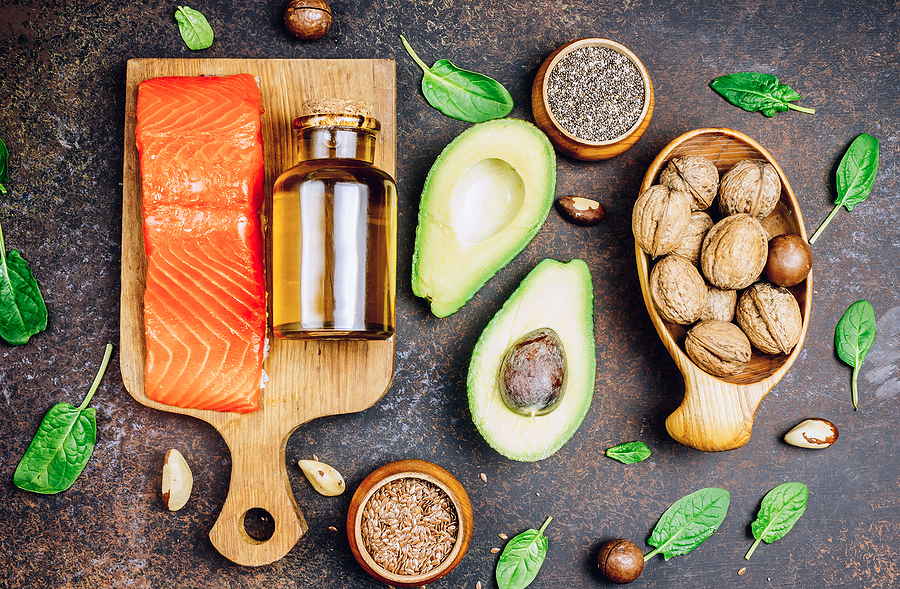I remember eating in a restaurant with a friend last year. I ordered broiled Salmon and a salad that included a few nuts and avocado slices. When it was delivered to the table, I drizzled olive oil on top, and was about to take my first bite when I caught the envious look in her eye. When I asked her what was up, she sighed and wistfully said “I wish I could eat food with fat in it. That looks so good!”
I’ve known for a long time that fat was a victim of marketing schemes designed to make sugar look good. But I forgot until that moment that there were still a plethora of women out there who believe that fat is the enemy. I’m here to tell you it’s NOT (just like I told my friend that day).
The low-fat craze is partially to blame, along with a general misunderstanding of fats in general. There are so many types of fat in food, and while trans fats and hydrogenated oils certainly should be avoided, healthy natural fats are actually an essential part of a well balanced diet. And here’s an even crazier fact: eating enough healthy fats can actually help you lose weight. That’s a lot different than what the media tells you, isn’t it?
Let’s take a look at what healthy fats are, why they’re so important to good health, and how you can easily incorporate more into your regular diet.
How fat became a villain
Let me tell you a story. Once upon a time, there was an industry that discovered that it may be contributing to a range of health concerns in the United States, including heart disease and obesity. Rather than admitting that their product should be enjoyed in strict moderation, they chose instead to launch a campaign against fat. What am I talking about? The sugar industry, of course!
If you’ve been reading my newsletters for any length of time, you know how I feel about added sugar. So many major health issues start with the overconsumption of sugar – and it’s hidden everywhere – even salad dressings and other condiments!
The industry, concerned as most industries are with profits above all else, needed to take the attention off of sugar and place blame squarely in someone else’s lap. And because some types of fat are unhealthy and contribute to weight gain, that’s where the energy was directed. In the 60s, much attention and research had been devoted to the impact of certain fats, and when a study (ironically, funded by the dairy industry) suggested that meat and butter were hard on the heart, the sugar industry used it to their advantage.
That’s when the Sugar Research Foundation (now the Sugar Association) funded two review articles published in the New England Journal of Medicine by professors of Nutrition at Harvard University. In these reviews, authors determined that sugar wasn’t the problem, and reducing fat and cholesterol intake were the only dietary measures that would impact heart health. This information became the driving force behind the low-fat diet recommendations. But the authors never disclosed that their funding came from the sugar industry – and that sounds like a conflict of interest to me!
Why fat is an important part of a healthy diet
Despite these efforts, you should know that fat is not the enemy. You need healthy fats to be healthy, and for weight loss. Natural fat increases immunity, provides energy, stabilizes blood sugar, and plays an important role in controlling hunger. Consuming fat prompts the release of Leptin, a hormone that triggers that “full” feeling. And when you don’t consume enough of the “good” fats your body needs, it tends to hold on to the pockets of fat that are stored in places you’d rather not have them – like around your middle, on your bottom or in your thighs.
Did you know that your brain is the fattiest organ you have? Cognitive function relies on the consumption of quality fats. The list of body functions depending on fat is long, and includes absorption of nutrients, building cell membranes to protect cells, blood clotting, fighting inflammation, hormone health, keeping skin, eyes and bones healthy, reproductive health, and optimal metabolism. That’s a lot of reasons to understand that eating fat is essential!
But here’s the catch; all fats are not created equal. Some are crucial for good health, and some are likely to lead to poor health if you consume too much. So it’s important to know the difference! You can read more about the different types of fat in my article Healthy Fat is not an Oxymoron.
Healthy Fats, Healthy Weight
The modern American diet has a great impact on your body – and not in a good way! For decades a steady stream of processed convenience foods has been pushed on us to match our over scheduled lifestyles. And that’s taken a real toll on the overall health and weight of Americans. The obesity problem is growing, and chronic health conditions are on the rise. But it doesn’t have to be this way.
In some areas of the world, called “blue zones”, residents live to be over 100 years old – and they are healthy, with an amazing quality of life! In these areas, people eat whole foods, including high quality fats, that provide them with the nutrients that promote optimal body function. Processed foods aren’t a part of their way of life – instead, they turn to fruits, vegetables, fresh fish and whole grains. And it works!
The truth is, there is no “one size fits all” diet that will work for everyone. In my practice, I am a big proponent of looking at people as individuals, and gathering the right information to see what will work for their own unique circumstances. There are so many factors at play – so a blanket statement that a particular diet is the best for everyone is absurd. In fact, my own genetic profile tells me that a low fat diet is best to help me maintain a healthy weight. But I also know that I still need the benefits of good quality fats and essential fatty acids. We all do! Balance is key.
There are some important things to understand in order to achieve this balance. First, every meal should incorporate healthy fats. If you eat the fattiest portion of the meal first (the fish before the rice, for instance), you will feel satisfied more quickly, which can help prevent you from overeating.
Omega-3 fatty acids are the healthiest form of fat, so boosting your intake of these is wise. Trans Fats – anything that says hydrogenated or partially hydrogenated oil – are the fats that should be avoided as much as possible. The good news is that those don’t occur naturally, so if you’re sticking to whole, natural foods, you won’t have to worry about that.
Deep frying saturates your food with fat, and the types used for frying aren’t typically the kinds you want to eat a lot of. Try an air fryer, which doesn’t require much, if any, fat at all. When cooking in oils (coconut oil and olive oil are best) do so at low, even temperatures. High temperatures can damage the fats. When consumed, these damaged fats cause your body undue stress, and are known carcinogens.
Eating these healthy fats can help you lose weight
Healthy fats are an important part of any weight loss program, since they help you feel full and more satisfied. Feeling deprived makes any diet hard to stick to! But when you consume these healthy fats in moderation, you’ll feel full longer – and they taste better than any packaged “diet food” you’ll find! Sometimes women worry when I tell them to eat these things, because they are higher in calories than many of the foods they’re used to eating on a diet. But I remind them that the old “calories in, calories out” model is false. The quality of calories matters more than the quantity, and healthy fats are top-notch in the quality department. Below are some of my favorite sources of quality fats.
Avocados
I love avocados not only because they are delicious but because they’re packed with nutrients and are incredibly versatile. Add a couple of slices to a salad, mash ripe avocados into a creamy spread (with or without spices) to use in place of mayonnaise on sandwiches, make a dip, blend into salad dressing – the options are endless. As an added bonus, avocados help your body absorb nutrients from the foods you eat alongside them.
Nuts and Seeds
These are another versatile, easy to add source of healthy fats. Sprinkle them in a salad, add to recipes, blend into smoothies, or just enjoy a small handful as a snack (it certainly beats grabbing a candy bar at the vending machine)! It’s easy to keep a small package of nuts in your desk drawer or glove compartment so you have a healthy option on hand when hunger strikes. Nuts and seeds are full of important minerals and vitamins, including B-complex vitamins and Vitamin E.
Whole Eggs
Eggs used to have a bad rep (like many other high fat foods) because of the fat and cholesterol in the yolks. Egg white omelets became all the rage, but in fact, most of the nutrients are in the yolks! New research indicates that the cholesterol in eggs doesn’t impact blood cholesterol for most people. And eggs provide so many nutrients and vitamins that I think they’re a perfect choice for breakfast – or dinner! They’re easy to prepare, satisfying, and high in protein, which is also important for losing weight.
Fatty Fish
Fish is a great source of the omega 3 fatty acids your body requires. There are many good options – salmon, mackerel, lake trout, albacore tuna and sardines, among other cold water fish – so keep trying until you find one you like. And if you simply can’t abide the taste of any fish, consider adding a fish oil supplement to your daily routine.
Coconut and Olive Oils
While these aren’t technically foods, both coconut and olive oil have so many health benefits, I’d be remiss not to mention them here. These are the healthiest oils for cooking, and they add great flavor. For both, quality matters, so don’t just choose the cheapest one you can find. Extra virgin is best.
Coconut oil can improve brain health, help prevent heart disease, reduce inflammation, boost your immune system, make you skin and hair healthy, and so much more. Coconut oil can be used for cooking at high temperatures, or you can put some in your coffee for an extra boost in the morning.
Olive oil also has many of the same health benefits (as do whole olives). Olive oil shouldn’t be used with high heat, but it makes a great salad dressing, and it’s great for dipping bread as well. Whole olives are a nutritious snack, and make a great spread.
Changing perception can be difficult, and with the media and food labels still pushing low-fat products, understanding the importance of fat can be tricky. Knowing the right kind of fats to add to your diet is essential. And the wealth of options means you can eat a healthy diet and be satisfied. Now that’s a win!







